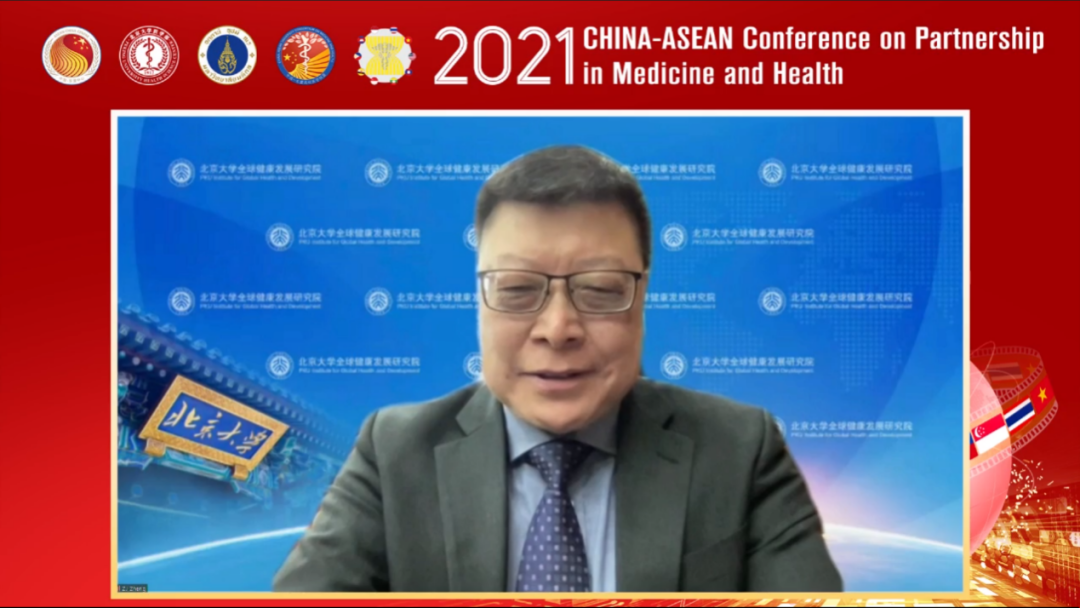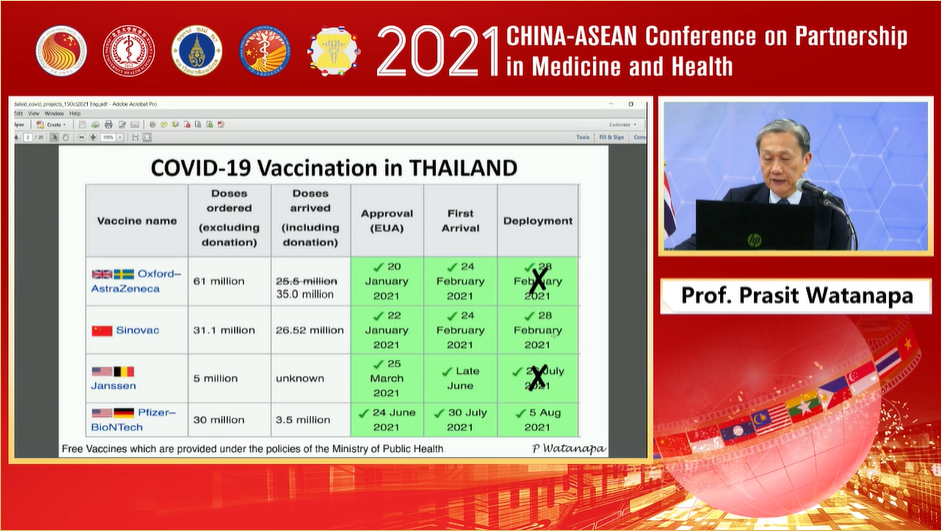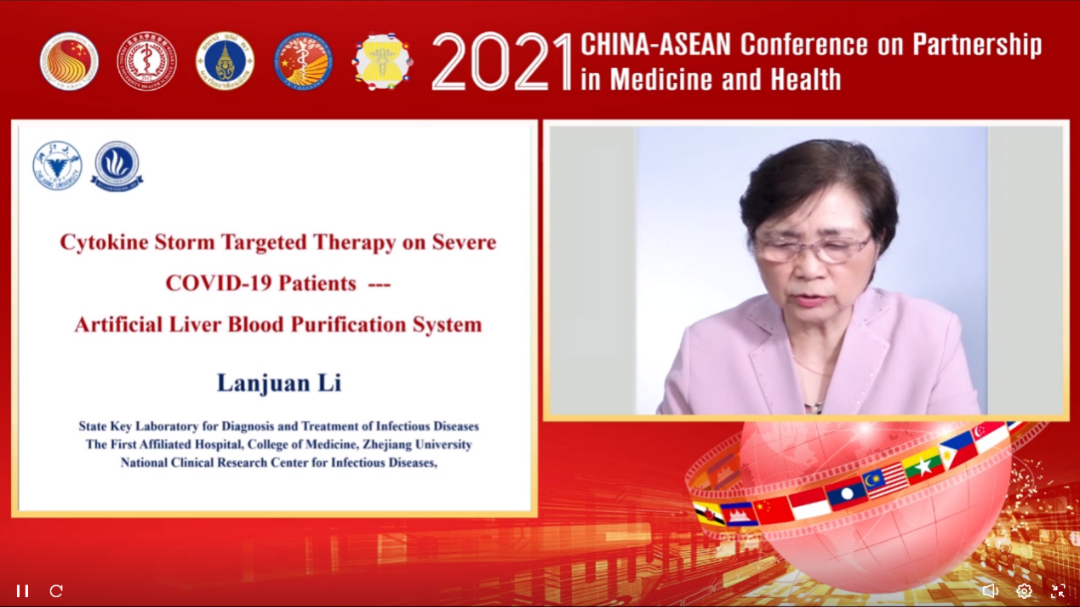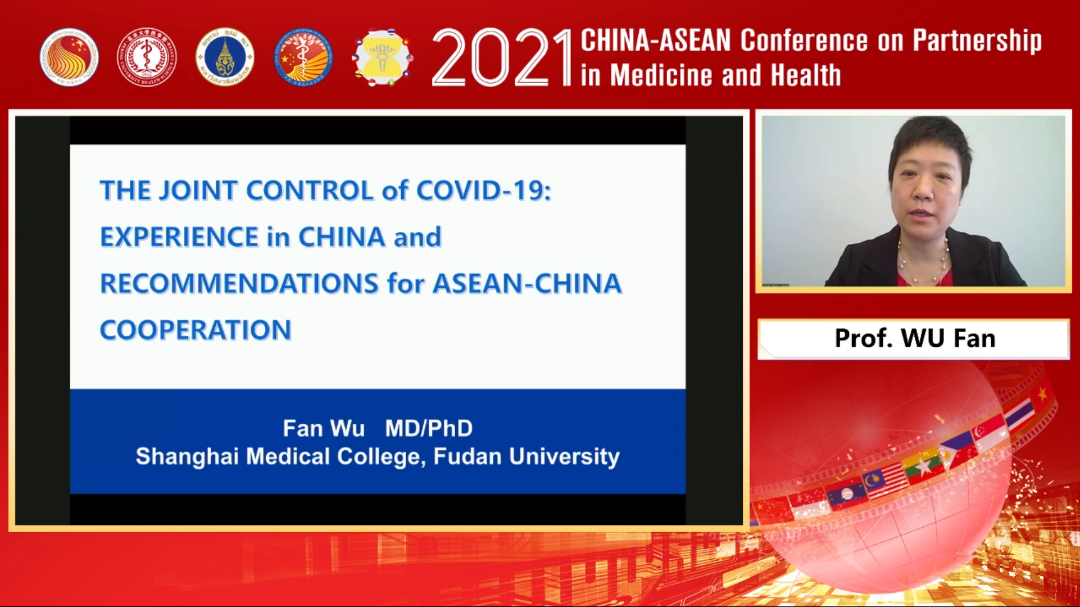On the morning of October 21, 2021, the "2021 ASEAN-China Medical Health Community Development Conference" and the "ASEAN-China University Consortium on Medicine and Health Annual Conference", co-sponsored by Peking University, the ASEAN-China Centre and Mahidol University and co-organized by the Department of Geohygiene of the Peking University School of Public Health, was successfully opened. Leaders, teachers and students of 21 Chinese universities and 22 ASEAN universities from the ASEAN-China University Consortium on Medicine and Health participated in the meeting online. The event embraced the opening ceremony of the annual meeting of the ASEAN-China University Consortium on Medicine and Health, the board meeting, and the keynote speech and sub-forum of the 2021 ASEAN-China Medical Health Community Development Conference.
Hao Ping, President of Peking University, Liu Jin, Director of the Department of International Cooperation and Exchange of the Ministry of Education, Qiao Jie, Executive Vice President of Peking University and Director of the Medical Department, Zhan Qimin, Deputy Director of the School Affairs Committee of Peking University and Chinese Chairman of the Association, Wang Hongliu, Director of the Comprehensive Coordination Department of the ASEAN-CHINA CENTRE, Prasit Watanapa, Dean of Faculty of Medicine Siriraj Hospital, Mahidol University and Chairman of the ASEAN side of the Association, Lau Tang Ching, Deputy Dean of Yong Loo Lin School of Medicine, National University of Singapore, attended the opening ceremony and addressed. Zhang Ning, Deputy Director of Peking University Health Science Center and Director of the Department of Scientific Research of Peking University, and Prapat Wanitpongpan, Deputy Dean of Faculty of Medicine Siriraj Hospital, Mahidol University, co-hosted the opening ceremony.

Professor Zheng Zhijie, Department of Global Health, Peking University School of Public Health, presided over the keynote speech session and delivered a keynote speech.

Professor Prasit Watanapa, Dean of Faculty of Medicine Siriraj Hospital, Mahidol University and Chairman of the ASEAN side of the Association, introduced the current immunization strategy against COVID-19 in Thailand, the current immunization status and the immune response effects of different vaccine combinations.

Academician Li Lanjuan, Academician from the Chinese Academy of Engineering, Professor of Zhejiang University, and Director of the National Key Laboratory of Infectious Disease Diagnosis and Treatment, introduced the research progress of targeted treatment of cytokine storm in severe patients with COVID-19 using artificial liver blood purification system.

Wu Fan, Vice President of Shanghai Medical College of Fudan University and President of Shanghai Institute of Major Infectious Diseases and BioSecurity, introduced the main response actions for the prevention and control of the COVID-19 in China, summarized the experience of the prevention and control of the epidemic in Shanghai, and raised suggestions for ASEAN-China cooperation on infectious diseases.
Professor Zheng Zhijie made brief comments on the three speakers, and finally made a concluding speech on "strengthening ASEAN-China Global Health Security Cooperation". He first stressed the importance and actions of ASEAN-China cooperation in the field of global health and security, and expressed that the current high incidence of new and sudden infectious diseases and the rapidly evolving infectious disease monitoring and early warning technology highlight the urgent need to reform the global health and security governance system, which requires countries, regions and the world to work together. ASEAN is close to China and has the most frequent economic and trade exchanges with it, but it is also one of the main sources of imported diseases in China. Since the COVID-19, whether from the leadership level or the national strategic level, China has strengthened the importance and action of cooperation with regional and global mechanisms, including ASEAN, in the field of health and security, making solid steps for ASEAN-China to jointly build a global community of health for all.
Professor Zheng Zhijie suggested that ASEAN-China further strengthen cooperation in the following five aspects: First, establish a monitoring, early warning and prediction mechanism for emerging infectious diseases, set up and improve a monitoring system for public health and security incidents dominated by infectious diseases, and timely find possible risk events and warn policymakers by building a mathematical model of infectious disease outbreak and transmission risks. Second, work with experts from China and ASEAN to strengthen technical and strategic research on the prevention and response of regional public health emergencies, and formulate emergency plans for it. Third, both sides should strengthen cooperation in the field of research and development of pathogenic microorganism detection technology. Pathogen detection technology based on gene technology should replace traditional pathogenic microorganism detection methods with fast, accurate and provincial gene detection to quickly identify known pathogens or discover new pathogens within 48 hours. Fourth, strengthen the connection of health and security strategies between China and ASEAN countries, formulate regional health and security strategies, and coordinate the preparation, monitoring and response to regional health and security incidents. Fifth, strengthen cooperation in talent training and think tanks between China and ASEAN countries to provide a talent base for regional health and security cooperation.
In the afternoon of October 21 and on October 22, the meeting held three sub forums with the themes of "New Infectious Disease Prevention and Control Technology and Policy", "New Infectious Disease Critical Diagnosis and Treatment Technology" and "Epidemic Information Analysis and Prevention and Control Strategy". The keynote speech and sub forum were broadcast online to the public.